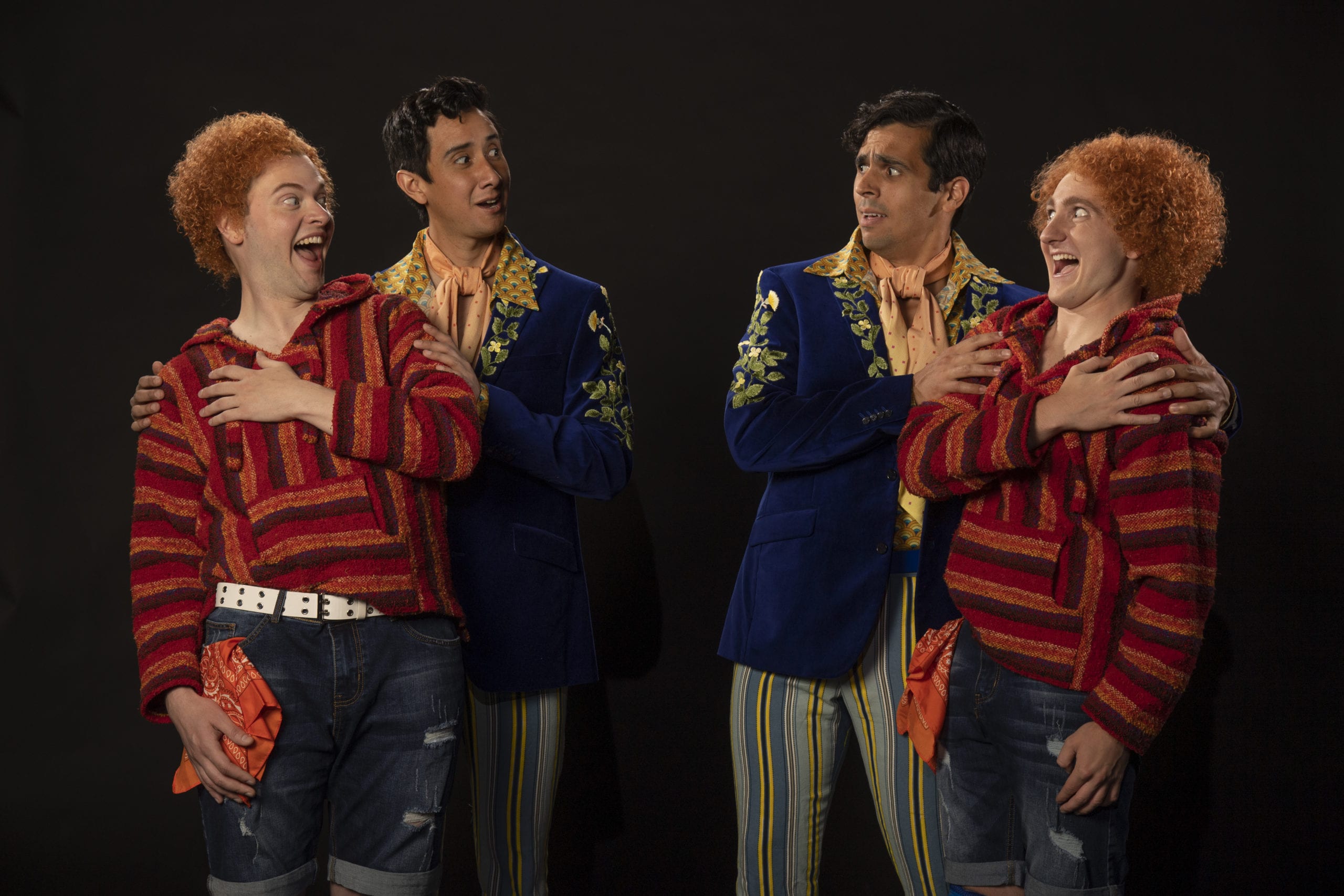CEDAR CITY — The Comedy of Errors is Shakespeare‘s shortest play, and that brevity contributes to its popularity. A series of humorous misunderstandings are packed into this play, and in the Utah Shakespeare Festival’s current production the audience little time to recover from one belly laugh before having another.

In The Comedy of Errors, two sets of twins have each been separated shortly after birth, due to a shipwreck. Antipholus and Dromio end up in Syracuse as master and servant (respectively), while each one’s twin brother — also named Antipholus and Dromio and also living as master and servant— wash ashore in Ephesus and live there. When the play begins, Antipholus and Dromio of Syracuse arrive in Ephesus and are promptly mistaken for their counterparts.
The play’s plot sounds more confusing than it really is because The Comedy of Errors is mostly a vehicle for slapstick and visual humor. Director Vincent J. Cardinal introduced the visual gags early and often. A joke of both Dromios using the upstage center door at the same time was especially effective, and I was surprised by how many uses there were for fish in this play. Cardinal also paced the play so that its madcap hijinks followed quickly in succession. Aiding this effort was the decision to always have at least one person on stage at all times, which made transitions between scenes rapid.

What is most impressive with Cardinal’s direction, though, was that the play never felt repetitive. Much of the dialogue in The Comedy of Errors consists of, basically, one person asking another, “Huh? What are you talking about?” (though not in those words, of course). Less gifted directors have difficulty varying the fundamental pattern of the scenes, but Cardinal had a seemingly endless variety of blocking, added jokes, and other directorial tricks to keep every scene unique and fresh.
The only shortcoming of Cardinal’s direction arose from his decision to set the play in the 1970s. Setting a Shakespeare play in a different time and/or place is a common practice, but it caries with it risks when a Shakespearean character or plot element does not fit well into the new setting. This happened with The Comedy of Errors when Dr. Pinch appears. The 1970s simply has no equivalent of an educated professional who diagnoses “lunacy,” works as a schoolmaster, and conducts exorcisms. Cardinal bizarrely made the character a death metal rocker. Enough said.
However, the 1970s setting allowed his designers a great deal of freedom to bathe the production in color. This is especially true for the costumes, designed by Kärin Simonson Kopischke, which consisted of bright hues, polyester fabrics, and garish patterns. Apollo Mark Weaver‘s set was painted in blues and white, with splashes of yellow, all designed to evoke the sun and sea of a Greek island. Together, the costuming and set are strongly reminiscent of Mamma Mia! It is not a bad association to make; the goal of both plays is to have give the audience a good time.
Mauricio Miranda stars as Antipholus of Syracuse, and Miranda handles the comedy effortlessly. Miranda’s wide-eyed wonder when the Ephesians’ recognize and greet him had a compelling innocence. Coupled with the character’s easygoing attitude, it was believable that Antipholus could “go with the flow” of the events around him. As a result, Miranda’s character’s surprised acceptance of his “wife” (really the wife of Antipholus of Ephesus) was a comedic gem and a plausible behavior. Miranda’s counterpart, Marco Antonio Vega, played Antipholus of Ephesus with a frustration that was palpable early on in the play when he was locked out of his own home. As the story progressed, the growing anger became a fertile source of humor as Vega expressed Antipholus’s exasperation through increasingly desperate ways.

Dromio of Syracuse was played by Michael Doherty as a lovable simpleton. Doherty is an expert at slapstick comedy, and his energy contributed greatly to the success of several scenes. Doherty was funniest, though, in his asides to the audiences. I usually do not like modern language introduced into Shakespeare plays because the change in tone and rhythm is so jarring, but these were all so brief and completely funny that I just laughed along with the rest of the audience. Andrew Plinio played Dromio of Ephesus memorably, and the character’s confusion and ability to take abuse because of his innocent mistakes made him a sympathetic character.
This is my favorite production of The Comedy of Errors that I have ever seen, and I can recommend it without reservations. Antipholus of Ephesus sums up the production best when he says that “Fie, now you run this humor out of breath.” These actors run so quickly from joke to joke, that the play’s 80-minute run time feels like only half that length. The Comedy of Errors is a breezy introduction to Shakespeare that aficionados can enjoy too.
[box]The Utah Shakespeare Festival production of The Comedy of Errors plays various dates at 8 PM through September 11 in the Engelstad Shakespeare Theatre on the campus of Southern Utah University. Tickets are $23-80. For more information, visit bard.org.[/box]

